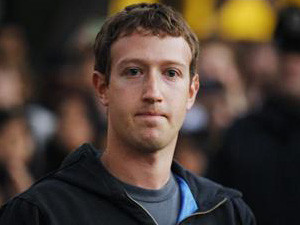
Facebook CEO Mark Zuckerberg has again rejected the idea that the social network affected the US presidential election, saying late Saturday it is "extremely unlikely" news hoaxes changed the outcome.
Last week, after the American people voted in Donald Trump as their new president, critics alleged the huge amount of fake news stories spread on Facebook (mostly anti-Democrat) had helped sway voters in the US.
The New York Times spotted several fake news stories, including that an FBI agent connected to Hillary Clinton's e-mail disclosures had murdered his wife and shot himself; that Clinton and president Barack Obama had promised amnesty to undocumented immigrants who voted for the Democrats; and that Pope Francis endorsed Donald Trump.
Recode reported Zuckerberg saying at a technology conference last week after the election that: "The idea that fake news on Facebook influenced the election in any way is a pretty crazy idea.
"I do think that there is a certain profound lack of empathy in asserting that the only reason why someone could have voted the way that they did was because they saw some fake news," he said.
Ensnared in a string of content controversies in recent months, Facebook has insisted it is a technology company, not a media firm. But scrutiny of the site has heightened since last week.
Mainstream surprise
Last week, it was reported that an analysis of social media, by BrandsEye, indicated Republican Donald Trump would win the US election, before the polls confirmed this to be true.
BrandsEye said it based its predictions on "accurately listening to over 27 million social media conversations by almost three million authors".
This was despite mainstream media predicting it would be a sure win for Clinton. This true prediction indicates voters used social media to gain information about the candidates and not traditional media.
However, Zuckerberg continued to defend his company in a post on his page this weekend.
Such hoaxes represent a sliver of content shared on Facebook and because they are not limited to partisan views or politics, it is unlikely they could have changed the election's outcome, Zuckerberg said.
"Of all the content on Facebook, more than 99% of what people see is authentic," he said, noting the network's goal is to "give every person a voice".
Still, Facebook has launched work to enable people to flag hoaxes and fake news, the statement said.
Facebook has faced a number of content controversies this year, including an international outcry after it removed an iconic Vietnam War photo due to nudity, a decision that was later reversed. The thorniest content issues are decided by a group of top executives at Facebook.
Money talks?
Venture capitalist and former CEO and co-founder of PayPal Peter Thiel was the first outside investor in Facebook. Thiel openly supports Donald Trump and donated $1.25 million to his election campaign.
Zuckerberg defended having Thiel as a board member and a Trump supporter in an internal message last month, saying: "We can't create a culture that says it cares about diversity and then excludes almost half the country because they back a political candidate."
It was reported this weekend the president elect has appointed the billionaire to the executive committee of his presidential transition team.
Thiel made headlines this year for contributing to the demise of news publication Gawker.com by helping fund Hulk Hogan's case against it.
Share